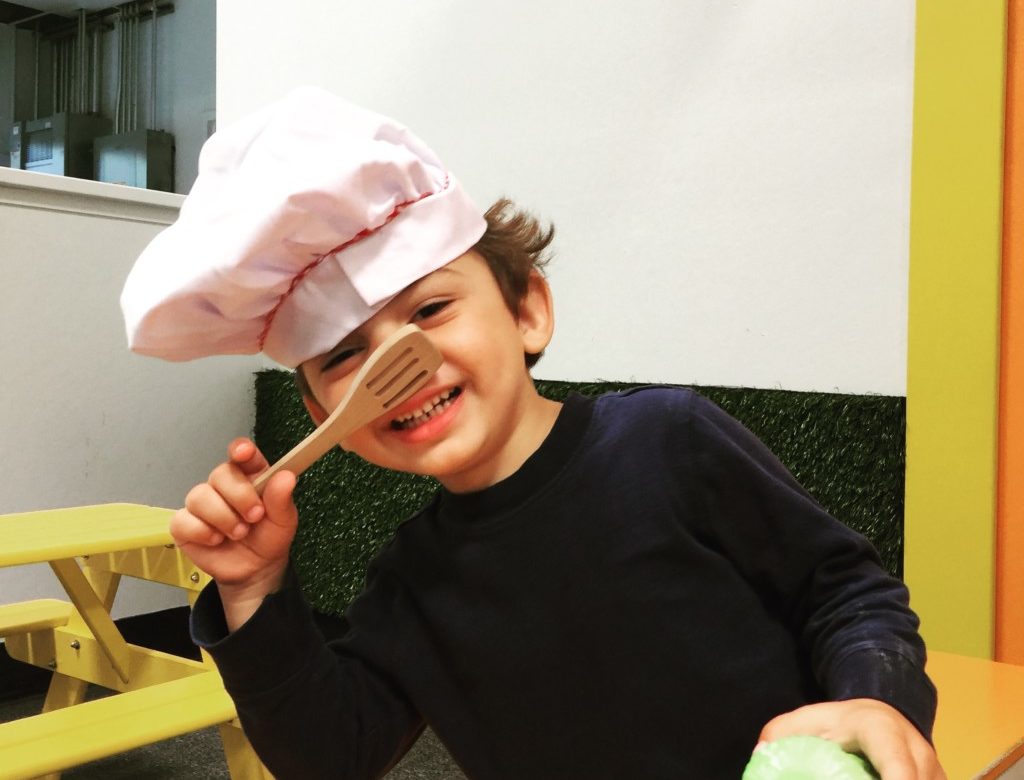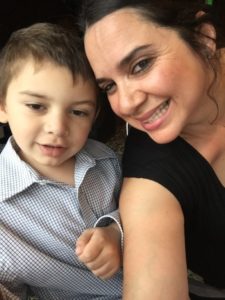
April is World Autism Awareness Month and with autism affecting 1 in 59 children in America, I feel like everyone knows a family dealing with the disorder. My good friend Jessica let me ask her some questions about her experience having a son on the autism spectrum. She has a 6-year-old son, Bentley (who is high-functioning autistic), and a 4-year-old girl, Reese. Here, Jessica shares her story and advice for other parents.
When did you first find out that Bentley was diagnosed with autism? Did you see any early signs that made you think something was wrong?
Bentley was officially diagnosed at 3 years old, but I knew something was different at around 15 months. I noticed that he wouldn’t respond to his name, he had constant ear infections, there was a delay in his language, he gave no eye contact—all things I thought were signs that he might have a hearing problem. I remember asking the doctor about all of these issues and she just said, “Oh, he’s a boy; it’s fine.”
I just knew that it was something more, so I got on a list for him to be looked at by a specialist (which was a 6-month wait list). After that appointment, he was diagnosed, and I got handed the autism packet.
What are some changes that you have made that have been beneficial in his behavior or overall well being?
I have him on a gluten- and dye-free diet. I have really seen a difference in his mood from making those changes, and it has really helped with his digestive system.
What’s your best experience with your child with autism?
Just being able to cuddle with him and getting up every morning knowing that we can take on this challenge together. I really try to trust the process, too. Sometimes things get better and sometimes things get worse, but I am really trying to be present and enjoy the journey. You can’t stay in the “Why me?” phase; you need to focus on the strengths and not the weaknesses.
Also, staying home with your child and not going out is not good either; you need to expose them to different situations and interactions with other children and people to help broaden their world and also know what their triggers are.
What’s the biggest struggle of having a child with autism?
Feeling like you are alone sometimes. It’s hard not being able to get time to myself, or even time for my husband and myself, because we can’t really leave Bentley with just a babysitter. I have experienced some people making certain comments about Bentley when we’ve been in public and he is having a meltdown or when he is humming or flapping his hands when he is stimming. I do fear the unknown future, when I get older, wondering who will take care of him and will he be able to live on his own.
But it is great seeing his sister Reese with him because she just knows that he is her brother not that he is a child with autism. She can see that he has trouble with certain situations and can’t vocalize the things that are bothering him, so sometimes she calls herself the big sister. She just said the other day that she is “Bentley’s words” to help him express what he needs.
Do you have any advice for other parents who are just finding out that their child has autism or who may think that their child has autism?
If you think that your child may have an issue because they are missing milestones or anything that just doesn’t seem right with you, I would say get on a list for a specialist for an evaluation—don’t hesitate. Sometimes you may even have to bypass your pediatrician and demand a referral for a hearing test or speech evaluation like I did.
 If you just found out that your child has been diagnosed with autism and you’ve been given the HUGE packet of resources and don’t even know where to start, I suggest calling the Autism Response Team hotline at 1-888-288-4762 or Parents Helping Parents (408) 727-5775 (Jessica is on the list as a parent you can call) because it is A LOT to process and there are so many great resources now. Also check with your insurance to see what they cover. You really need to be your child’s biggest advocate to get all these therapies because early intervention is key.
If you just found out that your child has been diagnosed with autism and you’ve been given the HUGE packet of resources and don’t even know where to start, I suggest calling the Autism Response Team hotline at 1-888-288-4762 or Parents Helping Parents (408) 727-5775 (Jessica is on the list as a parent you can call) because it is A LOT to process and there are so many great resources now. Also check with your insurance to see what they cover. You really need to be your child’s biggest advocate to get all these therapies because early intervention is key.
Finally, be involved. There are so many family groups and events to benefit autism research that it is so easy to find someone else to talk to who is going through the same things you are and it’s a great way for your child to interact with others and not feel judged.
Great Websites:
http://www.autism-society.org/get-involved/national-autism-awareness-month/
Editor’s note: This article originally published on April 18, 2016 and was reviewed and revised prior to republishing.
















Ash of course I cried reading this and it’s tough to put all down in one article but this is great ???? there are so many emotions involved with being a parent of a child that has a way of there own of living . To Ben were the ones that all need help and he’s right ! We need to adapt and get on his level to understand him ! I’m so for all the Therapy involved but we have to look at it as he is getting help to learn and educate himself at his most potential ! Therapy is not to make him “normal” or act and learn as his other peers do. No this is not the case. Parents should not feel therapy is something that will take the autism away as I don’t ! I wAnt to give Ben the tools to succeed how he knows best . I love my son and I know as parents we want to protect our children by doing things for them cause it help or to avoid tantrums but by allowing them to go through the motions weather it’s tough or not we’re only helping them. Bentley mommy loves you through and through ! Ashley Irvine thanks for the op of sharing a bit of bentleys world!
Beautifully written